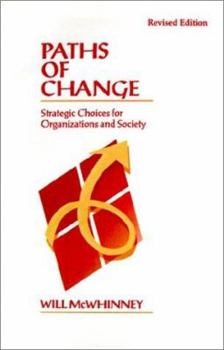Paths of Change: Strategic Choices for Organizations and Society
Select Format
Select Condition 
Book Overview
The substantially revised edition of Will McWhinney′s inspirational Paths of Change outlines a new foundation for the theory and practice of change, initiating discipline of praxis using concepts from psychology, sociology, anthropology and new methods of working with ontological and narrative concepts to produce intentional changes in society.
The components of McWhinney′s theory include: a map of four alternative realities; a guidance theory based on two great myths that have been used in many cultures over the past millennia; and the qualities required to deal courageously with the paradoxes of change and resolution efforts. The author indicates the critical role of leader and followers, and of the coevolution of
Format:Paperback
Language:English
ISBN:0761910174
ISBN13:9780761910176
Release Date:May 1997
Publisher:Sage Publications, Inc
Length:288 Pages
Weight:1.10 lbs.
Dimensions:0.8" x 6.0" x 9.1"
Customer Reviews
2 ratings
A briljant meta-model
Published by Thriftbooks.com User , 18 years ago
This book contains a meta-model that is applicable to almost everything. It gives the reader an opportunity to check if he has looked at all points of view that are possible.
"...profoundly influenced my professional practice..."
Published by Thriftbooks.com User , 25 years ago
This book breaks new ground and will impact many organization development theory and practice areas, such as cognitive styles, change management, and leadership for many years to come. McWhinney begins by introducing the reader to a model of "reality archetypes" that he claims underlie all individual and collective thinking processes in Western society. The four realities remind one of Jungian types, but differ in that these are more like worldviews than personalities.On one level, by using an instrument called "The Reality Inventory," one can learn how his/her personal worldview maps over McWhinney's model. This is useful for understanding how interpersonal conflicts are often, in essence, not as much fueled by divergent issues and interests, but by different mental models that influence how people define issues and communicate their interests. How often have we intervened in a conflict, only to discover that what appears to be a "real" difference over a substantive issues, turns out to be a battle over semantics? However, lest we be tempted to jump to "Men are from Mars..." pop psychological conclusions, it's important to note that McWhinney's approach goes any beyond any static "styles" theory.The reality model serves as a basis for new insight into the dynamic nature of change. Most of us know that when a major organizational change conflicts with existing organizational culture, the culture most often prevails and the change effort dies. This happens when change agents and their sponsors fail to understand that most planned change interventions require an organization to move into a new collective reality (or mental model, worldview, frame of reference, etc.). The symptom we call "resistance" develops as underlying conflicts between old and new worldviews surface. McWhinney describes six modes of change to help organizations traverse the "territory" of the reality map. Interestingly, these also connote six leadership styles.A short review doesn't do McWhinney's ideas justice. Repeated readings will yield new insights. I also highly recommend the companion volume, "Creating Paths of Change," especially for practitioners. Suffice it to say that this material has profoundly influenced my professional practice, as well as my personal life.





